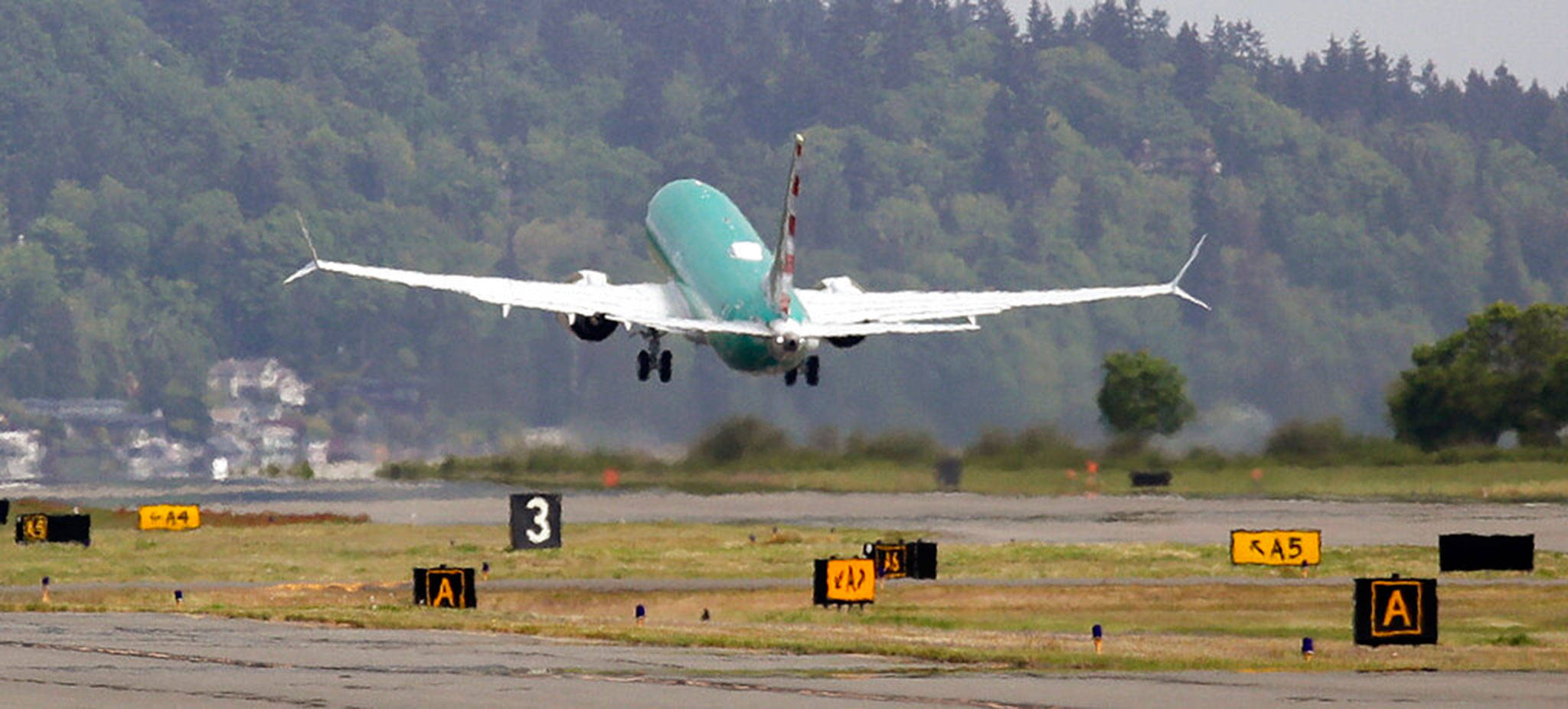By The Herald Editorial Board
There’s a popular internet meme — a cartoon of a wide-eyed and smiling dog sitting amid a burning house yet proclaiming: “This is fine” — that has been used in recent years to illustrate all manner of denial of disasters in progress.
We now have a new use for the meme in a report released Thursday by a federal Department of Transportation committee, tasked with examining the relationship between aerospace companies and federal regulators, specifically the Federal Aviation Administration’s practice of delegating a significant portion of safety reviews to manufacturers’ employees. The review was chartered by Secretary of Transportation Elaine Chao last April, following air disasters in which two Boeing 737 Max planes crashed because of a faulty software system, killing 346 passengers and crew.
The conclusion of the report, in essence: This is “effective,” “rigorous and robust.”
The report from the Safety Oversight and Certification Advisory Committee, five aviation industry insiders in consultation with pilots, engineers and managers at Boeing, FAA and elsewhere, recommended that the long-used practice — allowing manufacturers’ employees to certify significant portions of planes and parts under supervision of the FAA — not be “systematically dismantled.”
In defending the FAA’s program, the panel said reversing it could jeopardize “the remarkable level of safety that has been attained in recent decades,” Politico reported Thursday. And, yes, air carrier fatality rates have fallen significantly over the last 25 years. The fatality rate has dropped from about 81 deaths per 100 million passengers in 1996 to 0.6 per 100 million passengers as of 2019, the panel reported.
Yet, that fatality rate offers little comfort to families of those lost on Lion Air Flight 610 and Ethiopian Airlines Flight 302, and ignores disturbing details of investigations and revelations regarding those disasters, how the Boeing 737 Max was certified, how pilots were — or weren’t — trained and efforts to conceal concerns before and even after the first crash.
The report did make calls for the FAA and industry to address concerns about “undue pressure” on employees delegated by the agency to make safety reviews, among other recommendations. But the delegation program, the panel concludes, allows for the most efficient use of FAA resources and allows the aerospace industry to thrive.
Except, is the industry actually thriving when the latest version of a passenger jet — the most popular in the world with more than 10,000 of various models built — is grounded for nearly a year, its production is halted and airlines expecting the new planes are forced to make other plans?
The report by the panel will do little of the work necessary to restore confidence in both Boeing and the FAA among Boeing’s airline customers, the flying public and Congress, which already is considering how to move forward on the FAA’s safety regulation and flight certification of airliners.
U.S. Rep. Rick Larsen, D-2nd District, chairman of the House Transportation Committee’s aviation subcommittee, and the committee’s chairman, Rep. Peter Defazio, D-Oregon, have earlier said they intend to introduce legislation that would remove the authority of Boeing and other manufacturers to self-approve the aircraft and parts they make.
Recent news stories have only added to the mistrust felt regarding Boeing and the FAA:
Boeing last week released company emails and other documents that reflected dark humor about concerns regarding the 737 Max and the approval process, including one that ridiculed fellow colleagues: “This airplane is designed by clowns who in turn are supervised by monkeys.”
An FAA analysis, disclosed during a December hearing of the House Transportation Committee, showed that, following the first crash of the 737 Max, agency officials had estimated that as many as 15 similar fatal crashes could occur over coming decades if Boeing didn’t correct the software problem with an automated flight control system. Still, FAA officials didn’t move to ground the plane until after the second crash.
And Larsen and Defazio have pointed to notes from an internal discussion among Boeing managers, The Seattle Times reported last week, that revealed efforts to deceive safety regulators about the flight control system as certification work progressed.
Larsen, following the release of the Transportation panel’s report, maintained his committee’s review is far from over. Citing several other reports and recommendations, “one thing is abundantly clear: the method by which the FAA certifies aircraft is itself in need of repair,” Larsen said in a statement.
None of the steady flow of reports regarding the 737 Max, how it won certification from the FAA and the response by the agency and Boeing to the two air disasters can be easily waved away by Thursday’s panel report.
This is not fine.
Talk to us
> Give us your news tips.
> Send us a letter to the editor.
> More Herald contact information.

























